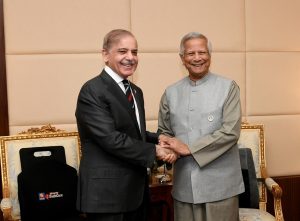The recent regime change in Bangladesh has triggered a Pakistan-Bangladesh rapprochement.
Since Muhammad Yunus took charge as leader of Bangladesh’s interim government on August 8, several high-level meetings have been held between Bangladesh and Pakistan, paving the way for new linkages and closer cooperation.
Pakistan’s Prime Minister Shehbaz Sharif has met Yunus twice since the regime change in Dhaka — on the sidelines of the United Nations General Assembly meeting in the U.S. and the D-8 Summit in Egypt in September and December 2024, respectively. During the D-8 meeting, Yunus urged Sharif to settle the issues of 1971. “The issues have kept coming again and again. Let’s settle those issues for us to move forward. It would be nice to (settle issues) once and for all for the future generations,” Yunus said. Yunus was referring to a longstanding Bangladeshi demand for an official apology from Pakistan for the genocide committed during the 1971 war.
Pakistan has long maintained that the India-Pakistan-Bangladesh tripartite agreement of 1974 settled these issues. In Cairo, Sharif agreed to look into “other outstanding issues.”
Bilateral relations between Pakistan and Bangladesh have been troubled since the 1971 Liberation War, and particularly frosty during periods of Awami League rule in Bangladesh. Since the ouster of Prime Minister Sheikh Hasina on August 5 last year, relations have thawed. And following the Sharif-Yunus meetings, Pakistan and Bangladesh have moved swiftly to improve ties.
First, in November 2024, Pakistan and Bangladesh established a direct maritime link between Karachi and Chittagong ports for the first time in 53 years, highlighting the former’s desire to base the new phase of ties on trade and business. On November 18, a cargo ship carrying goods from Pakistan, including raw materials for Bangladesh’s key garment industry and basic food items, unloaded at Chittagong port. It is important to note that Bangladesh has eliminated the 100 percent physical inspection of goods imported from Pakistan as part of ease of doing business to boost cooperation in trade, industry and shipping operations. This step will not only bring the costs down but also reduce travel time from 40 to 10-12 days. Earlier Pakistani cargoes destined for Bangladesh had to undergo 100 percent physical check at ports in Singapore, Malaysia and the UAE.
Second, Dhaka and Islamabad have decided to ease visa regulations and establish direct flight links between Dhaka, Islamabad and Karachi. There are plans too to start cargo flights between Dhaka, Karachi and Lahore. Direct flights will significantly reduce travel time and enable more frequent interactions between the business communities of the two countries. In January, Pakistan and Bangladesh also signed an agreement to establish a joint business council. Pakistan is hoping to export sugar, steel, surgical instruments, cement, dry fruits, pink salt, milk products, marble, and coal to Bangladesh. In turn, Pakistan could import tea and jute from Bangladesh.
Third, military-to-military ties between the two countries are also progressing smoothly since former Hasina’s ouster. On January 13-18, the Principal Staff Officer of the Armed Forces Division of Bangladesh Lt-Gen S. M. Kamr-ul-Hassan and his delegation met with Pakistan’s three services chiefs and the Chairman Joint Chiefs of Staff Committee Gen Sahir Shamshad Mirza. In less than a week after Kamr-ul-Hassan’s visit, a delegation from Pakistan’s Inter-Services Intelligence arrived in Dhaka for a four-day visit. Bangladesh has shown a formal interest in acquiring Pakistan’s JF-17 Thunder jets as part of its military modernization efforts.
Analysts have interpreted this engagement as a geopolitical move. However, military-to-military interactions notwithstanding, it is part of Pakistan’s ongoing effort to pivot from geopolitics to geoeconomics, to enhance and diversify its economic relations in the immediate neighborhood, with a focus on trade and connectivity.
Over the past few years, Pakistan has taken some steps to enhance its regional connectivity to boost trade, despite volatile security situation. For instance, it has signed a joint protocol with Afghanistan and Uzbekistan in 2023 to connect the Uzbek rail network with Pakistan Railways through Afghanistan. The route will pass through Termez in Uzbekistan, Mazar-i-Sharif and Logar in Afghanistan, and culminate in Pakistan through the Kharlachi border crossing in Kurram. Likewise, with China’s help, Pakistan is upgrading the 1,300-kilometer-long Karakoram Highway, which starts from Kashgar in Xinjiang and ends at Thakot in Khyber Pakhtunkhwa, to make it an all-weather route for cross-border trade. Recently, Pakistan has also opened the Gwadar International Airport and initiated flights between Gwadar and Muscat.
Though the transition has been far from easy, and geopolitics continue to dominate the overall strategic calculus of Pakistan, the country has been making small but steady progress toward this important transition. Pakistan’s macroeconomic indicators have steadily improved over the past year.
However, to move toward sustainable growth, while maintaining the hard-earned macroeconomic stability, regional connectivity and economic cooperation are critical.
Per se, Pakistan does not view its evolving relationship with Bangladesh through a zero-sum lens, where India’s loss is Pakistan’s gain. The India-Bangladesh trade volume in 2023-2024 stood at around $11 billion. In the same fiscal year, Pakistani exports to Bangladesh stood at $627 million and imports from Dhaka hovered at around $61.98 million. Hence, there is no comparison.
Pakistan is restoring ties with Bangladesh, not replacing India. Delhi needs to revisit its own policy of investing too heavily in Hasina which has backfired just as Pakistan’s myopic support for the Taliban resulted in a blowback from Afghanistan.

































